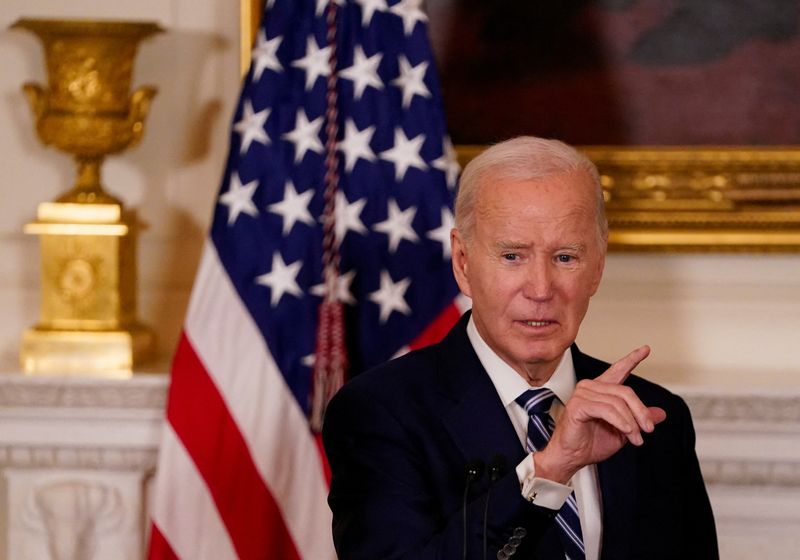By Timothy Gardner, Daphne Psaledakis, Nidhi Verma and Dmitry Zhdannikov
WASHINGTON/NEW DELHI/LONDON (Reuters) -U.S. President Joe Biden’s administration imposed its broadest package of sanctions so far targeting Russia’s oil and gas revenues on Friday, in an effort to give Kyiv and Donald Trump’s incoming team leverage to reach a deal for peace in Ukraine.
The move is meant to cut Russia’s revenues for continuing the war in Ukraine that has killed more than 12,300 civilians and reduced cities to rubble since Moscow invaded in February, 2022.
Ukrainian President Volodymyr Zelenskiy said in a post on X that the measures announced on Friday will “deliver a significant blow” to Moscow. “The less revenue Russia earns from oil … the sooner peace will be restored,” Zelenskiy added.
Daleep Singh, a top White House economic and national security adviser, said in a statement that the measures were the “most significant sanctions yet on Russia’s energy sector, by far the largest source of revenue for (President Vladimir) Putin’s war”.
The U.S. Treasury imposed sanctions on Gazprom (MCX:) Neft and Surgutneftegas, which explore for, produce and sell oil as well as 183 vessels that have shipped Russian oil, many of which are in the so-called shadow fleet of aging tankers operated by non-Western companies. The sanctions also include networks that trade the petroleum.
Many of those tankers have been used to ship oil to India and China as a price cap imposed by the Group of Seven countries in 2022 has shifted trade in Russian oil from Europe to Asia. Some tankers have shipped both Russian and Iranian oil.
The Treasury also rescinded a provision that had exempted the intermediation of energy payments from sanctions on Russian banks.
The sanctions should cost Russia billions of dollars per month if sufficiently enforced, another U.S. official told reporters in a call.
“There is not a step in the production and distribution chain that’s untouched and that gives us greater confidence that evasion is going to be even more costly for Russia,” the official said.
Gazprom Neft said the sanctions were unjustified and illegitimate and it will continue to operate.
U.S. ‘NO LONGER CONSTRAINED’ BY TIGHT OIL SUPPLY
The measures allow a wind-down period until March 12 for sanctioned entities to finish energy transactions.
Still, sources in Russian oil trade and Indian refining said the sanctions will cause severe disruption of Russian oil exports to its major buyers India and China.
Global oil prices jumped more than 3% ahead of the Treasury announcement, with nearing $80 a barrel, as a document mapping out the sanctions circulated among traders in Europe and Asia.
Geoffrey Pyatt, the U.S. assistant secretary for energy resources at the State Department, said there were new volumes of oil expected to come online this year from the U.S., Guyana, Canada and Brazil and possibly out of the Middle East will fill in for any lost Russian supply.
“We see ourselves as no longer constrained by tight supply in global markets the way we were when the price cap mechanism was unveiled,” Pyatt told Reuters.
The sanctions are part of a broader effort, as the Biden administration has furnished Ukraine with $64 billion in military aid since the invasion, including $500 million this week for air defense missiles and support equipment for fighter jets.
Friday’s move followed U.S. sanctions in November on banks including Gazprombank, Russia’s largest conduit to the global energy business, and earlier last year on dozens of tankers carrying Russian oil.
The Biden administration believes that November’s sanctions helped drive Russia’s rouble to its weakest level since the beginning of the invasion and pushed the Russian central bank to raise its policy rate to a record level of over 20%.
“We expect our direct targeting of the energy sector will aggravate these pressures on the Russian economy that have already pushed up inflation to almost 10% and reinforce a bleak economic outlook for 2025 and beyond,” one of the officials said.
REVERSAL WOULD INVOLVE CONGRESS
One of the Biden officials said it was “entirely” up to the President-elect Trump, a Republican, who takes office on Jan. 20, when and on what terms he might lift sanctions imposed during the Biden era.
But to do so he would have to notify Congress and give it the ability to take a vote of disapproval, he said. Many Republican members of Congress had urged Biden to impose Friday’s sanctions.
“Trump’s people can’t just come in and quietly lift everything that Biden just did. Congress would have to be involved,” said Jeremy Paner, a partner at the law firm Hughes Hubbard & Reed.
The return of Trump has sparked hope of a diplomatic resolution to end Moscow’s invasion but also fears in Kyiv that a quick peace could come at a high price for Ukraine.
Advisers to Trump have floated proposals that would effectively cede large parts of Ukraine to Russia for the foreseeable future.

The Trump transition team did not immediately respond to a request for comment about the new sanctions.
The military aid and oil sanctions “provide the next administration a considerable boost to their and Ukraine’s leverage in brokering a just and durable peace,” one of the officials said.

